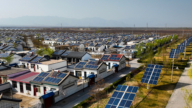【新唐人2014年08月28日讯】日前美国《福布斯》杂志发文指出,今年以来中国各项经济指数暴跌,显示出火爆了近40年的中国经济,终于崩溃了。而自5月份以来,一直被用来支撑中国地方政府财政的土地拍卖,流拍的现象也频繁涌现。专家指出,中国实际情况比数据显示的还要糟糕。
美国《福布斯》杂志专栏作家章家敦25号发表文章“中国经济火了40年,终于要崩溃了”。文章中以中共最近发布的各项经济数据,详尽的分析了中国经济崩溃现象。
例如,7月份,外国直接投资同比下降了17.0%,进口下降1.6%﹔而作为中国最全面借贷指标的社会融资规模,在7月份竟然下降了86.1%,新增贷款也创下2008年10月以来的最低水平,显现出经济基本面的整体疲软态势。
本来,尽管7月份公布的中国制造业PMI预览指数51.7,和其他数据有些矛盾,但比起从前年起就一直在48.2 到50上下徘徊,似乎稍微挽回了一些局面。而刚刚公布的8月份中国制造业PMI预览指数,又下滑到50.3,让分析师大为震惊。美国《华尔街日报》形容,这一数据,给一些原本指望中国经济今年“先抑后扬”的经济学家,浇了一盆冷水,中国经济面临一场“攻坚战”。
清华大学经济管理学院教授杨斌:“其实国内就是一种经济危机的状况,有好多特征,股市的跌,物价的通货膨胀,企业的凋敝,人们消费能力的不足,去年或前年就是这种状况了,只是数据或许统计出来比较晚”。
中国金融智库研究员巩胜利曾经指出,对于经济学家来说,全球其他国家的经济都可以通过透明的数据来预测,但是对中国而言,如果仅仅通过数据来预测,只能四处碰壁。
2008年,中共依靠大量印制钞票,向经济体注入大量现金,躲过了全球经济衰退的最坏影响,但由于过分投资基础建设和房地产,造成的资源浪费和错配,却无法挽回。
目前,尽管当局宣布,只会使用“微刺激政策”或“定向措施”,事实上还是在尽可能迅速地向经济体注入资金。
6月份,金融机构投放了1.08万亿元人民币的新增贷款,在5月份的基础上猛增了40.7%,比去年同期增长了14.7%。而这些新增贷款,主要还是流向了国家和地方政府实体。
杨斌:“民营企业成本都百分之好几十了,银行只针对国有企业,对民营企业收得紧,没有优惠政策,企业就没法活啊,降税或减税都不能使民营企业起死回生了。”
清华大学党委书记,经济学教授杨斌指出,犹如僵尸般的国营企业,已经成为中国经济的严重拖累。
大陆经济学家杨佩昌:“每个人都把住自己的一小块领域,比如说,你在某个领域改革,它就会问你,你为什么不在其他领域改革呢,那你又不可能全面性的改革,在中国这种体制下,全面性的改革可能性是不大的。”
而今年以来,随着房地产市场的持续下滑,北京、广州、成都、深圳等一线城市,和多个二三线城市,都频繁的出现土地流拍现象。
中国经济评论家牛刀指出,中国房地产崩盘,就是从北京土地流拍开始。而房地产的崩盘将影响到多个上下产业链 ,几乎波及整个经济领域。
采访编辑/刘惠 后制/李勇
China Economic Index Plunges, Experts Predict Crash
China’s economic performance has taken a plunge this year
and Forbes magazine says it’s a sign of the end of China’s
four-decade economic cycle.
Land sales, which local governments have heavily relied on
financially, also show signs of staggering.
Experts are saying the real situation is even worse than
what the data shows.
Columnist Gordon Chang contributed an article to Forbes on
Aug. 25, titled, “The End of China’s Four-Decade Economic
Cycle," describing the collapse of China economy
with detailed data analysis.
For example, Chang said, “Foreign direct investment plunged
17.0%; imports fell 1.6%; and total social financing,
China’s most-inclusive measure of lending, dropped 86.1%.
“New credit of 273.1 billion, the lowest since October 2008,
suggested fundamental weakness throughout the economy."
According to Wall Street Journal, “the preliminary HSBC
China Manufacturing Purchasing Managers Index fell to
50.3 in August—a three-month low—compared with a final
reading of 51.7 in July."
“That was below the expectations of economists."
The data has dashed many economists’ hopes that China’s
economy would finish the year strong after a slow start.
“China’s economy faces an uphill battle for the rest of 2014″
added WSJ.
Yang Bin, professor at Tsinghua University School of
Economics and Management: “In fact, the domestic situation
shows economic crisis on many fronts,
such as the stock market drop, inflation, depressed industry,
and low consumption capacity.
It has been like this since two years ago. The data came late."
Chinese financial think-tank researcher Gong Shengli once
said that for economists, prediction is normally done
using transparent data.
But in China, data based predictions can only be troublesome.
In 2008, the CCP flooded the economy with cash
to avoid the worst effects of the global downturn.
But excessive investment in infrastructure and real estate
has resulted in irresolvable waste and misuse of resources.
The regime claims to only use “micro-stimulus" or “targeted
measures," but behind-the-scenes, is pouring cash into China
as fast as possible, according to Forbes.
In June, they issued 1.08 trillion yuan in new loans.
Total social financing rose 40.7 percent since May,
while the amount of money in circulation (M2)
rose 14.7 percent since last year.
Chang says, “From all indications, the June loans largely
went to state and local government entities."
Yang Bin: “Bank loans only target state-owned enterprises,
even though private enterprises have higher operational costs.
Without preferential policy,
even tax cuts can’t save the private enterprises."
Yang Bin says that the zombie-like state-owned enterprises
have become a serious drag on the economy.
Yang Peichang, economist: “Everyone is holding onto his area.
If the reform is conducted in one area,
they will question, what about other areas?
There is just no way to conduct comprehensive reforms
in China.
Under such a regime, there is little likelihood
of any comprehensive reform."
The decline in the real estate market has taken place in first
tier cities such as Beijing, Guangzhou, Chengdu, and Shenzhen.
Staggering land sales have also appeared
in a number of second and third tier cities.
China economic critic Niu Dao says that China’s real estate
crash began with the drop in Beijing’s land sales.
The effects of the real estate collapse will be felt
in many upstream and downstream chains of the industry,
and nearly all throughout the entire economic world.
Interview & Edit/LiuHui Post-Production/LiYong





























